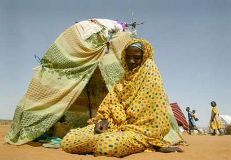Two years on, UN still at odds over ‘world’s worst humanitarian crisis’
KHARTOUM, Feb 25 (AFP) — Two years after an ethnic minority uprising prompted Sudan’s military-backed government to unleash a savage crackdown in Darfur, 1.6 million displaced people face the threat of famine and the world remains at loggerheads how best to intervene.
 A 10-month-old ceasefire in the huge western region the size of France has failed to take hold amid persistent reports of government air raids and massacres by allied militias.
A 10-month-old ceasefire in the huge western region the size of France has failed to take hold amid persistent reports of government air raids and massacres by allied militias.
Peace talks sponsored by the African Union in a key test of the continent’s ability to police its own affairs broke down in acrimony in December, prompting increasingly desperate UN officials to call for urgent Western intervention in what they describe as the world’s worst current humanitarian disaster.
Two weeks ago, UN Secretary General Kofi Annan called for EU or NATO intervention, saying: “People are dying, every single day, while we fail to protect them.”
Last week, UN emergency relief coordinator Jan Egeland warned that UN agencies’ success in staving off famine so far was unsustainable without decisive “political and security action” by the world community.
“We did prevent the massive famine that many predicted, but I think now it’s time to say we may perhaps not be able to do so in the coming months if the situation keeps on deteriorating,” he said.
The UN appeals were rapidly picked up on by Darfur’s two rebel groups who have made their return to peace talks with the government conditional on Western participation in overseeing any new truce.
But the Khartoum regime insisted it would accept only the existing African Union ceasefire observer mission whose 1,850 monitors have struggled to cover the vast arid expanses of Darfur.
And talk of Western intervention raised by Australia and Britain last summer has gone quiet amid the continuing conflict in Iraq.
A UN commission of inquiry last month found Sudanese government officials and their militia allies guilty of war crimes and crimes against humanity, and recommended prosecution of 51 named suspects.
But trials remain a long way off amid deep divisions over jurisdiction.
The increasingly isolated Arab-dominated regime in Khartoum insists it will accept no trials outside Sudan while Washington wants a special court modelled on the Rwanda genocide tribunal established in Arusha, Tanzania and the United Nations wants cases heard by the International Criminal Court in The Hague.
Human rights watchdogs have documented a litany of abuses by the army and its allies in Darfur which they say include the routine use of rape as a weapon of war.
Washington and Berlin have both said the government’s crackdown amounted to genocide against the region’s indigenous non-Arab minorities — particularly the Fur, Zaghawa and Masalit.
But a US draft resolution put before the Security Council earlier this month, which would have imposed travel and financial restrictions on war crimes suspects, has yet to be put to the vote amid deep differences.
International concern has heightened since the Khartoum government finally signed a long-awaited peace agreement with southern rebels early last month ending two decades of civil war with the mainly Christian and animist south.
World leaders have voiced fears that the continuing violence in Darfur will unravel the hard-won treaty ending Africa’s longest-running conflict which cost an estimated 1.5 million lives.
The renewed unrest in Darfur was in part sparked by the Sudan People’s Liberation Movement’s decision to accept a peace deal limited to the south and adjacent areas, abandoning the championing of all Sudan’s marginalised minorities that marked its policy through the late 1980s and early 1990s.
Unrest also broke out earlier this month among the Beja minority of eastern Sudan, with protests in the main town of Port Sudan put down by riot police at the cost of at least 14 lives.
The agreement with the SPLM provides for a referendum on independence for the south after six years of transitional autonomy.
Foreign diplomats have argued that the only long-term solution for the Darfur conflict is a similar measure of self-rule for the impoverished region, which is nonetheless believed to harbour significant mineral wealth beneath its soil.
But despite the low ebb in its international credibility, Khartoum insists that the region already enjoys sufficient autonomy through the heavily centralised federal system long in force in Sudan.
Analysts have questioned whether the government can change that position without relaxing the firm grip it has held since seizing power in a 1989 military coup that saw all political parties outlawed.
